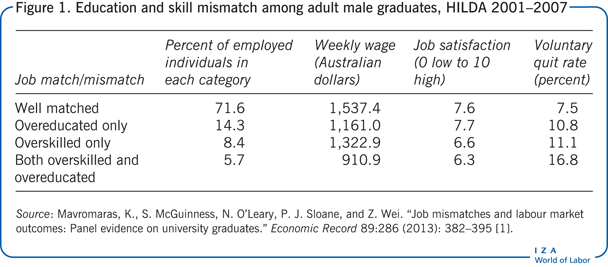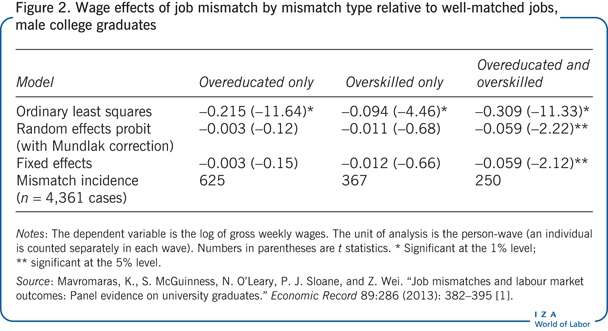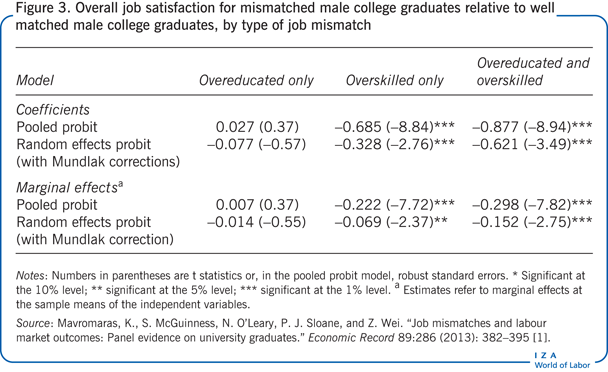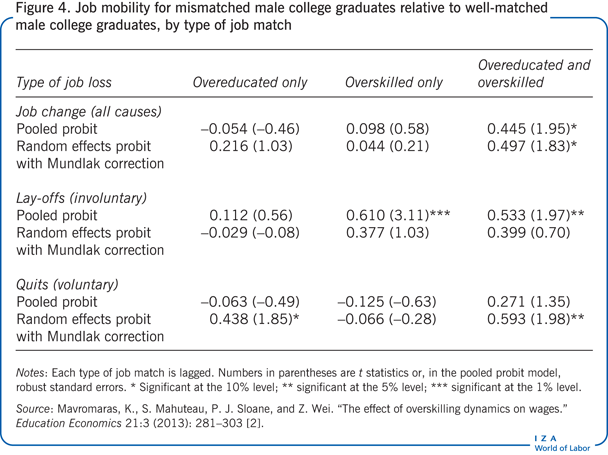Elevator pitch
There is evidence that many college graduates are employed in jobs for which a degree is not required, and in which the skills they learned in college are not being fully used. Most of the literature on educational or skill mismatch is based on cross-sectional data, providing information at just one point in time. Drawing meaningful conclusions about mismatch, its dynamics, and its relationship to wages, job satisfaction, and job mobility requires panel data, which can reach more nuanced conclusions by allowing for individual differences, e.g. choosing a job because it offers compensation.
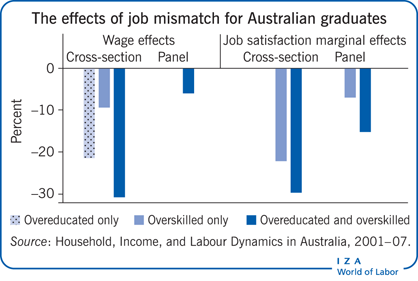
Key findings
Pros
Many college graduates are employed in jobs for which a degree is not required, and in which the skills they learned in college are not being fully used.
Empirical analyses based on cross-section data suggest that overeducation is a sign of market failure.
These studies find a significant wage penalty and a reduction in job satisfaction for overeducated workers.
Cons
Some studies do not allow for individual differences or preferences; if overeducation is an investment in future earning power, mismatches are temporary and require no policy intervention.
Some choose to work in jobs for which they are overeducated since they offer compensating non-pecuniary advantages.
Panel data suggest no wage penalty for men who are overeducated or overskilled, and a small penalty for those who are both.
Overeducated workers find it easier to change jobs than overskilled workers or workers whose jobs and education are well matched.
Policymakers should focus on reducing the incidence of widespread overskilling, which reduces worker welfare and harms employers’ interests.
Author's main message
Labor market mismatches (where employee qualifications do not match job requirements or are not used on the job) can result from overeducation or overskilling, two distinct phenomena. Studies that suggest a wage penalty and/or reduced job satisfaction from overeducation do not account for individual differences or preferences and should hence be treated with caution. Panel data show that policies should be more concerned with overskilling, which is likely to be harmful both to the welfare of employees (lower job satisfaction) and the interests of employers (lower productivity).
Motivation
The share of the workforce with a higher education is increasing in many countries, requiring large investments in time and resources by students and often substantial government support and financing. Yet there is evidence that many graduates are employed in jobs that do not require a college degree and in which the skills they obtained in college are not being fully used. What does this mismatch tell us about the supply and demand for graduates? (See Types of job/education mismatch.)
There are many reasons why the supply of and demand for graduates might not match in a dynamic labor market. For example, the nature of jobs may be changing so that jobs that were once filled by workers without a college degree now require college graduates, because the work has become more complex.
Most of the literature on education or skill mismatches that has found significant negative consequences in wages and job satisfaction from mismatches is based on cross-section data, which provide information at just one point in time. But drawing meaningful conclusions about education and skill mismatches, job dynamics, and the causal relationship to wages, job satisfaction, and job mobility requires the use of panel data, which consist of repeated observations for the same individuals over time, usually once a year, referred to as a wave.
Panel data can reveal whether mismatches are temporary or permanent and shed light on whether any negative repercussions of mismatches encountered early in a working life, such as wage penalties and low job satisfaction, are reversible later through training or experience. The lack of panel data has hampered attempts to elucidate such issues. An exception, explored here, is a series of recent studies based on panel estimation of graduate mismatch using the Household, Income, and Labour Dynamics in Australia (HILDA) survey [1], [2]. The survey includes a question on skill mismatch and provides sufficient data on graduate qualifications and employment to estimate overeducation and control for unobservables, such as ability or preferences. (See Studies of overeducation.)
Discussion of pros and cons
Overeducation and overskilling
Overeducation and overskilling are distinct phenomena, as indicated by their low correlation (r = 0.197). A novel feature of the new work based on HILDA panel data that is discussed here is the categorization of graduates into four mutually exclusive groups: well matched in both education and skills; overeducated only; overskilled only; and both overeducated and overskilled [1], [2]. This categorization proves to be very illuminating when the effects on wages, job satisfaction, and job mobility are compared (Figure 1). Thus, 28.4% of the sample are mismatched, earning less than matched workers and having lower job satisfaction if overskilled and a higher voluntary quit rate.
The panel data
Panel data estimation has distinct advantages over cross-section analysis for examining the impacts of job mismatch over time. Using methodologies based on panel data strongly reduces the size of many of the coefficients, throwing doubt on the results of cross-sectional analyses, which have predominated in the literature. The analysis using the Australian panel data shows that the relationship between job mismatch and labor market outcomes is strongly influenced by unobserved individual differences. Above all, the results shown in Figure 1 suggest that, at least at a descriptive level, it is a combination of overeducation and overskilling, rather than either one individually, that has the most damaging outcomes.
Although the HILDA data are for a single country and a group of male graduates, there is reason to believe that the Australian data are not that atypical. True, comparing 2005 HILDA data with data from the European Working Conditions Survey of the same year for all employees finds that the pattern of Australian educational and skill mismatch does not match that apparent across much of the EU, either in the aggregate or in individual countries, but there is also substantial variation across European counties in the extent of mismatch, and the Australia data are bounded by individual country estimates within the EU. For economy of space, the analysis here is limited largely to men. While the mismatch pattern is similar for women, the negative wage and job satisfaction effects are stronger for women than for men, which suggests that mismatch is more damaging for women.
The HILDA sample is restricted to an unbalanced panel of working-age, full-time, paid male employees with a college degree or equivalent qualification for whom complete information was available in the data set on the variables of interest such as wages, job satisfaction, and job mobility [1], [2]. The sample size is approximately 700 individual observations per wave. Overskilling is derived from HILDA data using the response on a seven-point scale to the statement “I use many of my skills and abilities in my current job.” The overeducation measure is obtained by comparing educational attainment with the modal level in each occupational group. Respondents are also asked to rank their job satisfaction on a scale of 0 to 10 [1], [2].
The results are highlighted here less for the findings themselves and more as illustrations of how to address shortcomings in the literature and emphasize important elements of the analysis. To allow for comparisons with the earlier literature, a pooled ordinary least squares (OLS) model was used to estimate the wage effects of mismatch as a benchmark. Pooling across waves enables a direct comparison to be made with cross-section studies. For job satisfaction and job mobility, which involved binary variables, a pooled probit model was estimated as a benchmark (see Econometric models). For dealing with unobserved individual heterogeneity, a random effects probit model with a Mundlak correction was estimated.
Wage penalties
Controlling for unobserved individual differences removes most of the negative wage impact found in studies with cross-section data for male college graduates who are overeducated only or overskilled only (Figure 2). Only male graduates who change from a well-matched job to one for which they are both overeducated and overskilled suffer a wage penalty compared to the omitted reference category (of just under 6%, in both random effects and fixed effects models, as opposed to over 30% in the OLS estimates).
Job satisfaction
Job satisfaction is treated as an outcome of mismatch by observing the impact that each type of mismatch has on the level of satisfaction after controlling for other factors that might influence satisfaction (Figure 3). Where a mismatch does not reduce job satisfaction, it is likely that the mismatch reflects a voluntary underutilization of qualifications or skills. Being overeducated on its own has no discernable effect on job satisfaction among the HILDA sample. (A similar result was obtained for the UK [3].) In contrast, being overskilled, whether alone or combined with overeducation, greatly reduces job satisfaction. Thus, while cross-section analysis shows a negative marginal effect on job satisfaction of being overskilled of 22.2%, panel estimation reduces the effect to only 6.9%. For people who are both overskilled and overeducated, the reduction in job satisfaction is much larger, at 15.2%.
Job mobility/quitting
Only overeducation on its own, as shown by the significant coefficient for voluntary quits when panel estimation is used, or jointly with overskilling, as shown by the significant 0.593 coefficient, increases the probability of quitting as a consequence of job mismatching (Figure 4). Male college graduates who are overskilled only are no more likely to quit than are male graduates who are well matched, after the analysis controls for unobserved individual differences, as indicated by the –0.066 insignificant coefficient. This finding, when combined with the negative effects of mismatch on job satisfaction as shown in Figure 3, suggests that overeducated graduates or those who are both overeducated and overskilled tend to be trapped in jobs that have undesirable characteristics.
Persistence of the effects of job mismatches
Some studies have suggested that overeducation may be a form of investment in training or experience that can boost future returns to human capital [4]. If true, this would mean that mismatch was a temporary phenomenon, which would greatly reduce the need for policy intervention. To determine whether that is the case, studies need to examine the propensity of mismatched workers to remain in mismatched jobs.
Persistence can be examined using a dynamic random effects probit specification that includes a lagged dependent variable. Using this approach with HILDA data, and incorporating nine waves covering the period 2001–2009, shows that an overskilling mismatch is highly persistent in a manner that is inversely related to education level [2]. The effect of previous overskill mismatches on present overskilling mismatches is positive but diminishes over time. The first lag of an overskilling mismatch increases the present probability of an overskilling mismatch for a college graduate by 15 percentage points, and so on across waves. A college graduate who has never been overskilled for a job has a 4.6% probability of becoming overskilled in the following year. By contrast, a college graduate who was overskilled in each of the previous three years has a 38% probability of being overskilled in the following year. Although data are available for only a limited period, this suggests high persistence or a scarring effect from being in an overskill mismatch.
Though college graduates suffer less from persistence than do other mismatched workers, they suffer a greater wage penalty than any other group. The results also suggest that higher paid college graduates face the largest wage losses, consistent with higher wages being offered as compensation for taking greater risks. Public policy therefore needs to consider not only the extent and persistence of skill mismatch, but also the size and persistence of the associated wage effects of such persistence if the problem is to be targeted efficiently.
How results with pooled data differ from those with cross-section data
The results reported here differ from those of studies based mainly on cross-section data in a number of ways. First, the results for the pooled data show a significant wage penalty only for male college graduates who are both overskilled and overeducated but not for those who are only overskilled or only overeducated. Second, overeducation on its own has no adverse effect on job satisfaction. Job satisfaction is affected only by overskilling on its own or combined with overeducation. Third, unobserved individual heterogeneity matters. In several cases, the panel estimations reduce the significance of findings compared with those using cross-section data. Together, these differences suggest that policy attention should focus on preventing overskilling, particularly when combined with overeducation, rather than on overeducation alone. Job recruitment should aim to secure a better match between skills of new hires and the jobs they fill. Doing so could benefit both employees and employers by boosting productivity, improving morale, and reducing the quit rate [5].
Limitations and gaps
One limitation of the current research is that the data are for a single country only. Unfortunately, no current panel surveys other than HILDA include a relevant question on skill mismatch. While it is possible to estimate overeducation by comparing an individual’s education level with the mean or the mode in a given occupation, a measure of skill mismatch cannot be constructed in a similar way. The European Household Panel Survey, conducted between 1994 and 2001, did contain a question on skill mismatch, and the results revealed a marked incidence of skill mismatch. These data are becoming increasingly outdated, however, and no new surveys have collected similar information.
Little work has been done on horizontal mismatching (see Types of job/education mismatch), which requires detailed information on both the type of qualifications held and the importance of different types of qualification in particular occupations. A study for the US reports that 20% of college graduates were mismatched horizontally in 1993. Among graduates who were mismatched, those whose studies emphasized general skills, such as a humanities specialization, had a greater likelihood of mismatch but incurred lower costs in terms of wages from mismatching than graduates whose studies focused on acquiring specific skills, such as in medicine, law, and engineering [6], [7]. A study for Sweden found that 23% of men and 17% of women were horizontally mismatched and a further 18% of men and 8% of women were weakly mismatched [8]. The wage penalty is large for both sexes. Clearly horizontal mismatch is an important phenomenon requiring study, as does the combination of horizontal and vertical mismatch.
Another question still to be answered concerns the role of employers in generating job-skill mismatch. The European Centre for the Development of Vocational Training (Cedefop) notes that empirical evidence on the issue is limited because of the scarcity of appropriate data, such as employer surveys with questions on skill mismatch, matched employer–employee data sets with such questions from both sides of the employment relationship, and administrative data on firm performance and panel data on employers [9]. Preliminary evidence from enterprise surveys supports a positive association between the share of overeducated workers in a firm and firm productivity. Though there may be a wage penalty to being overeducated, such workers are still paid more than the matched workers with whom they work.
Summary and policy advice
Results from analysis based on cross-section analysis suggest that overeducation indicates some form of market failure. Such studies find that many college graduates are employed in jobs that do not require a college degree and in which the skills they obtained in college are not being fully used [3], [6], [7], [8], [10]. These same studies find a wage penalty and reduced job satisfaction for overeducated workers. These findings need to be interpreted with caution, however, because the studies make no allowance for individual differences and preferences. Some workers may choose to work in jobs for which they are overeducated because they offer them compensating nonpecuniary advantages or better future job opportunities or because it was the only job that they could get because they have low ability given their qualifications. These possibilities suggest that the market may at least in part be working efficiently. Precisely why employers hire workers to positions in which they are mismatched is a question that needs to be answered, but information on this is lacking.
In contrast, estimates based on the Australian panel data suggest that there is no wage penalty for male college graduates who are overeducated or for those who are overskilled. The estimates do show a small wage penalty of just under 6% for workers who are both overskilled and overeducated, however. The estimates reveal negative job satisfaction effects for the overskilled, however, with marginal effects that are much larger for workers who are both overskilled and overeducated. They also reveal that overeducated workers have significantly higher voluntary mobility than workers whose qualifications and jobs are well matched, suggesting that overeducated workers who wish to change jobs can do so. The same is true for workers who are both overskilled and overeducated. There is no significant difference in mobility for workers who are overskilled only.
All of this suggests that policymakers should be more concerned about any evidence of widespread overskilling, which is likely to be harmful both to the welfare of employees and to the interests of employers, than overeducation on its own. Employers need to adopt human resource strategies that maximize the inputs of their employees. Government agencies also need to enhance data-gathering initiatives, including household surveys with a panel element and matched employer–employee surveys. Asking workers and employers about the reasons for job mismatches might be the most effective way of finding answers. Employers should be informed of the potential negative effects of overskilling and the value of improving hiring practices to ensure that there is a good match between workers and the jobs they do, at least in the long term.
Acknowledgments
The author thanks two anonymous referees and the IZA World of Labor editors for many helpful suggestions on earlier drafts.
For his research on the Economic and Social Benefits of Vocational Education and Training and Analysis of Skill Mismatch the author received financial support from the European Centre for the Development of Vocational Training. This paper uses unit record data from the Household, Income, and Labour Dynamics in Australia (HILDA) Survey. The HILDA project was initiated and is funded by the Australian Government Department of Families, Housing, Community Services and Indigenous Affairs and is managed by the Melbourne Institute of Applied Economic and Social Research. The author is particularly grateful to co-authors of previously published work, in particular Kostas Mavromaras, Stephan Mahuteau, Sue Richardson, Josh Healy, Zhang Wei, and Rong Zhu, National Institute of Labour Studies, Flinders University, Adelaide, Australia; Nigel O’Leary, Swansea University, UK; and Seamus McGuinness, Economic and Social Research Institute, Dublin, Ireland. Any errors or omissions are, however, his own.
Competing interests
The IZA World of Labor project is committed to the IZA Guiding Principles of Research Integrity. The author declares to have observed these principles.
© Peter J. Sloane
Types of job/education mismatch
Overeducated: An individual has completed more years of education than the current job requires. Though often used interchangeably with overqualification, overeducated is used more commonly because it does not require estimating years of education.
Overqualified: An individual holds a higher qualification than the current job requires.
Overskilled: An individual is unable to fully use acquired skills and abilities in the current job.
Vertical mismatch: The level of education or skills is less or more than the required level.
Horizontal mismatch: The level of education or skills is appropriate, but the type of education is not. The Household, Income, and Labour Dynamics in Australia data set does not provide the data needed to estimate this type of mismatch.
Studies of overeducation
Sources: Carroll, D., and M. Tani. “Overeducation of recent higher education graduates: New Australian panel evidence.” Economics of Education Review 32 (2013): 207–218.
Dolton, P., and A. Vignoles. “The incidence and effects of overeducation in the U.K. graduate labour market.” Economics of Education Review 19 (2000): 179–198.
European Centre for the Development of Vocational Training (Cedefop). Skill Mismatch: The Role of the Enterprise. Research Paper No. 21. Luxembourg: European Union, 2012.
Frenette, M. “The overqualified Canadian graduate: The role of the academic program in the incidence, persistence, and economic returns to overqualification.” Economics of Education Review 23 (2004): 29–45.
